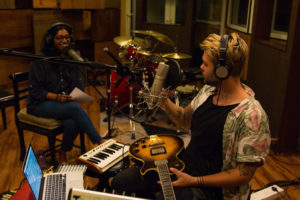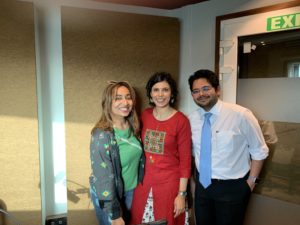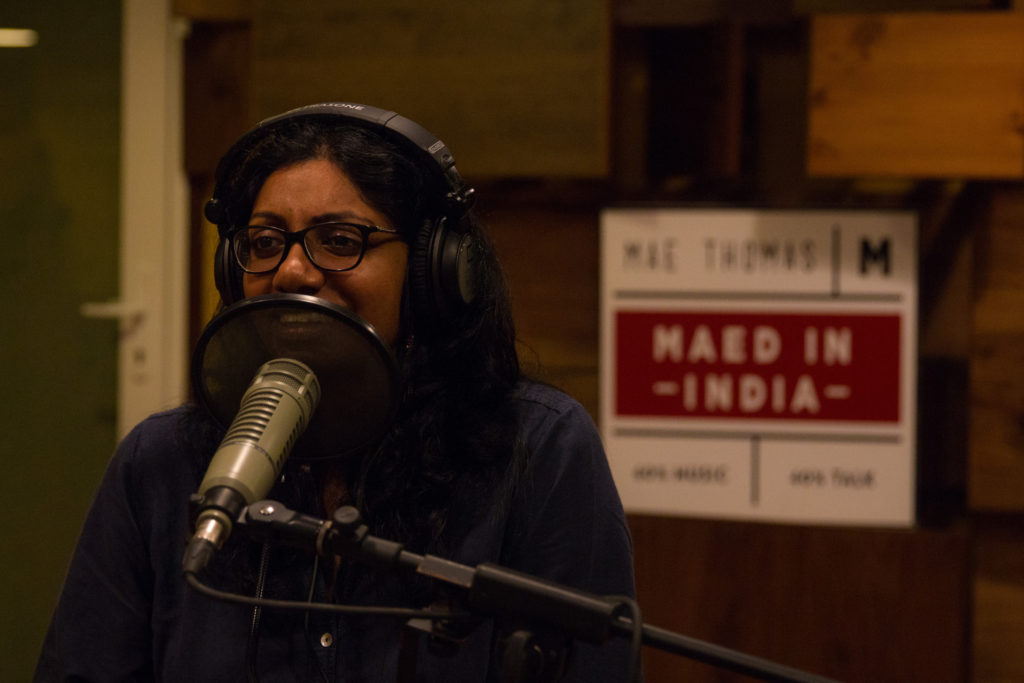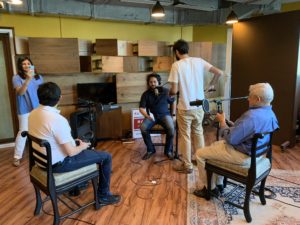She is on a hustle with her shows and power-packed schedules. Her voice, with an accented tinge, the realism and the connect she brings to the show, makes you want to stay tuned. Her podcasts, rated as Apple’s Best Podcasts of 2018 list in India brings a plethora of diverse and outstanding talent to the forefront. She has released over 170 episodes of Maed in India and featured all kinds of artists from new-comers to veterans, under a variety of genres from hip hop, blues, soul, to folk, punk, rock, and everything in between.
Maed in India is a platform for independent musicians where they can speak freely about their music and their artistry. The weekly show prides itself on being the destination for new music, little known stories, and has grown to become an ongoing archive of unreleased music that artists feel comfortable sharing and performing, she says.
Tad different from the usual podcasts, her platform recently launched the show, “She Says She’s Fine”. The podcast got guests conversing with gynaecologist Dr. Munjaal Kapadia, Director of Namaha Healthcare (based out of Mumbai), on issues revolving around women’s health, their scars and fears and most importantly, unboxing the hushed topics.
Many women experience a sense of pressure and a deep anxiety to do exceedingly well in the professional space and in the home-front. She says she feels good but she is in a lot of pain. She says its nothing but it really is a lot. She is not fine.
Meet this veteran podcaster Mae Thomas, Founder of Maed in India. In a conversation with Chennai Insider, she talks about her journey so far, the challenges, what keeps her going, the excitement of running a podcast and, the making of the podcast, “She Says She’s Fine” , the process of curating the show around women’s health and much more insights.
Tell us about yourself, Mae. What were you doing before starting Maed in India?
So I come from a radio background with over a decade of experience in the radio industry in the UK, Chennai and Mumbai. I began my career as a news editor for a community radio station in the UK. Eventually I returned to India and worked at Chennai Live 104.8FM, an English radio station in Chennai, as their Creative Manager. Thereafter, I moved to Bombay and joined erstwhile NH7.in as a music journalist/sub editor. I’m most well known for hosting the afternoon request show, Mumbai On Demand on 94.3 Radio One. Eventually from broadcast radio, I explored the growing medium of podcasting and became the Creative Director of the biggest podcasting network in India, Indus Vox Media. However, since last year, I have started running my own indie music podcast, Maed in India independently and soon received enquiries about creating podcasts for people and since then I started my podcasting company & consultancy.
What inspired you to start Maed In India? Were there clear set-out themes when you started?
I started Maed in India in Feb 2015. I had quit radio in Dec 2014 and a month later I was approached by a company called Indus Vox Media (IVM Podcasts) as they wanted me to host a podcast for them. And so I decided to create an indie music show because I was quite jaded by the fact that radio stations in India won’t play independent music (and if they did, it was usually relegated to a singular day at non-peak hours, ie. the late late night slot). I’m an 80s-90s kid and radio was a place where I discovered music. Not anymore. So I wanted to bring that idea back, that feeling of curiosity and discovering something new.
There aren’t many sources in mainstream media to discover new music on a regular basis. The mission of the show was to create a platform for indie musicians where they can speak freely about their music and their artistry. Last year, I decided to pursue Maed in India independently – you could say I’m an indie gal, doing an indie show about indie music. In the process of working on my podcast Maed in India, I was approached (or should I say, whatsapped) by pastry chef/businesswoman/social media tycoon Pooja Dhingra to produce her podcast, NoSugarCoat. And I did. Eventually, her show #NoSugarCoat and Maed in India were picked as Apple’s Best Podcasts of 2018 list in India.


Any specific reason as to why you wanted your platform to be a “podcast” and not a regular YouTube video?
Well, besides making my own podcast, Maed in India, when I was working with IVM, I was hired as their Creative Director, where I was in charge of expanding their portfolio of podcasts and guiding the design of shows through training hosts, ideation, editing, packaging, production, segments, and show structure.
So, when I eventually wanted to undertake Maed in India independently, I was taking on what was already my forte. I have been working in audia media throughout my career, whether it was radio or podcasting more recently. Video production or starting a YouTube channel wasn’t something I wanted to focus on solely as podcasting was an unexplored medium in India I was excited to experiment with it. Not saying that I wasn’t interested in having a YouTube channel (my podcast Maed in India does have it’s own channel), my primary objective was to create podcasts, and YouTube was a promotional tool, or to showcase behind the scenes footage, and be supplementary to the podcast I was creating.
What were your apprehensions as a founder before launching it?
Financial stability. I have worked in full time jobs and been a freelancer for years, but this was the first time I was taking such a huge risk and placing a bet on my ability to grow an ecosystem for my work and for others to work in and collaborate with me. No one can predict the future or say for certain what will happen to you or your company. All people can do is believe in you, your idea and what you hope to build. I have been really fortunate that I’ve had a great team around me who’ve been encouraging and helped me through a lot.
Tell us about your team?
Shaun Fanthome – Partner/Legal Council/Financial Advisor/Administrator/ Head of Production and everything in between. Met him about 4 years ago through a friend.
Sharanya Subramanian – Producer. She works with us on all our podcasts – working on content ideas, designing shows/episodes, etc. We hire her on a project-by-project basis and hope to afford hiring her full time. Met her through another company I used to work for, OML and then we worked together in IVM.
Vijay Doiphode – Sound Editor/Audio Engineer. He handles all the editing and sound design for all our podcasts. And for Maed in India’s live studio sessions, he mixes and masters all the music. He is hired on a project-by-project basis but we hope to hire him full time. He worked in a studio that I recorded Maed in India in for the first time. He’s been a long time collaborator since then.
Jishnu Guha – Videographer. He & his trusty camera help create brilliant video promos for Maed in India & he captures the witty banter and musical performances on the show. He’s a musician and has featured on my show a couple of times and I helped make his podcast Geekfruit. He first worked as a videographer for me when I did my first Maed in India Live event.
Jehangir Jehangir – Owner of Island City Studio. Him, his studio & his team are an integral part of all our podcast recording. He has created a haven for us to create real magic. He’s a well-known drummer from Bombay and I’ve known him since he was in college and he was part of a band called Something Relevant. He’s had a studio called Cotton Press Studio where I wanted to record Maed in India out of but never did and this is the first time we are working together so closely.
How did you reach out to people for interviews when you started off? Was it easy to get in touch with a lot of people? Did you have contacts?
Getting in touch with people for interviews comes easily to me. I come from a journalistic background and I dig around to find contact details by hook or by crook. Regardless of busy schedules I will hound people to make sure they come on my show. I’m not someone who is hindered by ego that I’ll get offended if someone doesn’t have time to be on a podcast. Just because an opportunity doesn’t present itself now, doesn’t mean that it would be possible later. And whatever guests I’ve had on Maed in India – from Apache Indian, Indian Ocean & Euphoria to artists like Aditi Ramesh, Corner Cafe Chronicles, Mali, etc, everyone has always been willing to be part of the show because it comes out of real love and passion for music.
Take us through a day in your life, from dawn till dusk?
I wake up in the morning. Usually chill with my Amma before she heads to work. I flip open my laptop and plan work I have to do for the day. I usually have 2 different kind of days – a meeting-filled day where I’m running around the city or I am sitting in one spot (could be my home, or the little office space a friend has kindly given me to use whenever I need to, or at any coffee shop in the city, or my usual haunt – Doolally in Khar). If I have a Maed in India recording it’s usually in the evenings at Island City Studio which could be anywhere between 3-5 hours long. Or if it’s She Says She’s Fine, it early in the morning as the doctor has to head to his hospital after. Usually the day entails my partner Shaun and I getting together to build our company, nurture it and grow it.
As a founder, what keeps you awake?
- Keeping ourselves financially stable.
- All the work I have to do that week.
- All the work that is pending from the week before.
- Creating my Amma’s Retirement Fund
What would you say is the biggest learning about life before and from Maed in India journey?
My biggest learning has always been my belief in the power of the voice and it’s impact on people. Having someone in your ear, talking to you directly, brings a comfort and a sense of belonging. The audio medium is so powerful that even the Prime Minister of India has a monthly radio broadcast (compulsory to air by every radio station in the country) called Mann Ki Baat. And if you look at how captivating podcasting is, in 2015, Barack Obama was a guest on Marc Maron’s podcast WTF and recorded from his garage!
Your Podcast, She Says She’s Fine, is different from the rest of your work.Was that a conscious choice?
Well, I’ve been making podcasts for over 4 years and yes, She Say She’s Fine is very different from anything I had worked on before but I have produced numerous shows that aren’t at all related to music. I was the Creative Director of a podcasting company before I ventured on my own and it was my job to create a vast array of podcasts about subject areas like fashion, food, public policy, sports, comedy, etc. She Says She’s Fine was definitely in my wheelhouse of expertise. The most important aspect of creating a great show is research – to make sure you understand what kind of health podcasts exist in the world, what can we do that will serve the subject matter better, what is not being covered in the mainstream, how can we set ourselves apart, how can we get the most from every recording we do, etc. All of these questions are an essential part for me when I’m creating podcasts.
So how did “She Says She’s Fine” podcast kick-off?
Dr. Munjaal had approached me to create a podcast and of course I was curious as to how I would make a show for a gynac. When I spoke to him for the first time about what kind of podcast we were going to create, I knew there was something that set him apart from anyone I’d ever met. He has an amiability and charm that makes it so easy to talk to him. He’s calm, doesn’t judge and makes you feel like your point of view is valid and valued. And this was just what made him a good host. The great added bonus was that he was an experienced gynecologist who grew up in a family of gynecologists. It was his geniality and expertise that would set this show apart. Eventually once we created our pilot to understand what shape this show would take, we knew we had some incredible stories from women which was going to take center stage.
Did you have a set-structure for the show, as to how you were going to handle the conversation about women and women’s health?
We had to figure out what format this show would take, and initially the show was going to be one-on-one conversations with the doctor and patients who he knew wanted to talk openly about their health issues so that women wouldn’t feel like they were alone in their problems. However, one-on-one conversations are intimidating and I wanted to be able to have all kinds of women on the show. Which is where we decided having two women as guests would help spur the conversation on as you have another ally with you, while the doctor is guiding the conversation as well as providing his own medical opinion when required. Even the guests we wanted to feature on the show were meticulously picked. So this was a very conscientiously created show and at the same time we allowed the idea to live, breathe and grow.


On Season 2 (if there would be and hope so), what content do you wish to cover?
Yes we are working on Season 2, and we want to dive deeper into the subjects we’ve covered previously. For example, within our periods episode, we have a lot of people asking about PCOS, which is becoming a common, terribly misunderstood problem among young women. Or for instance,
How to educate young boys and girls about their bodies and sex, Abortions: protocol, procedure, legality, Health & Personal Finance, Breast Health, Consent, Female orgasms and of course… a whole lot of AMAs (Ask Me Anything)!
How has the feedback been for She Says She’s Fine?
We have been so lucky that the responses to the show have been so positive and encouraging. It really reinforces our beliefs that there is a real need for a show like this and it’s shocking that no one has done something like this already. We receive messages every day telling us how a particular episode helped someone through a difficult time. How it let them know that they weren’t alone. Specifically, what has been most refreshing is all the support we have received from men. They’ve been so heartwarming and elated at the fact that this show exists. A lot of men have gone out of their way to promote She Says She’s Fine, which goes to show, we’re doing something right.
What has been the hardest episode to make and why?
With regard to She Says She’s Fine, it was I’m Not Fine. That episode was really important for us to handle sensitively. It was about how to deal with sexual abuse and violence against women. We had a chance to talk to two incredible women in this space – Donita Quadros, a project associate with the Commonwealth Human Rights Initiative who works on police reform along with Dr. Nayreen Daruwalla from an NGO called SNEHA who works towards Prevention of Gender Violence. This episode was very important because rather than be anecdotal, we wanted to communicate vital information so that anyone listening would know what to do if they’ve been/or know someone who’s been abused – from going to the hospital, filing a police complaint, dealing with the cops, talking to a counsellor, what are your rights, etc. Given the nature of the episode, we wanted to make sure we had all our ducks in a row with regards to how we were making it and what kind of conversation we were going to have, so our research and having the right guests on board were paramount.
What do you hope to achieve with your podcasts?
For more and more people to listen.
I want to grow my podcasting initiative – be creatively bold, nurture ideas, help creators find their voice and have a definitive impact.
Concluding, what would be your advice to someone who wishes to start a podcast?
Before you record anything, before you switch on your mic, make sure you have a great idea. I’m told by my partner in Maed in India, Shaun Fanthome, that I have the ability to “hear ideas” and when you’re telling someone about your show they should instantly be enamoured and think, “Gosh I want to listen to that”. Also, always do a test pilot of your show. It helps you understand what your show will sound like, help you navigate making it better and troubleshoot all your problems. So, when you start production on your show, you have made your mistakes, solved them and created a formula for your show to follow.
Want to tune in to the podcast?
Here is how you listen to Maed in India :
Here is how you listen to She Says She’s Fine :
Know a great story or want to tell us your own? Write to us at content@chennaiinsider.com and we will get back to you. For more updates follow Chennai Insider on Facebook and Instagram.


